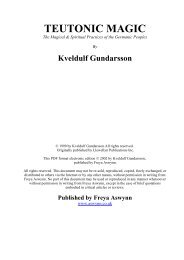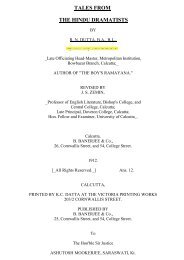Untitled - Awaken Video
Untitled - Awaken Video
Untitled - Awaken Video
You also want an ePaper? Increase the reach of your titles
YUMPU automatically turns print PDFs into web optimized ePapers that Google loves.
Chapter 6. The Sky 148<br />
with many unknown variables as in the case when the first settlers came to Iceland<br />
and needed to deal with the yet “wild” landvættir who had up to the time of the<br />
first settlers little or no interaction with men. It was understandable, then, that<br />
there would be many bad years until the immigrant family had completely aligned<br />
itself with the flow of luck seeping up from the Underworld or had been able to coax<br />
luck to flow their way. This was a natural course of life in the Germanic worldview.<br />
But, for the Christian, any bad year was automatically interpreted by the Church<br />
to be a punishment for some transgression against the new God (which may have<br />
been somewhat confusing for the newly converted Christian who believed he had<br />
committed no “sins”). For the Heathen, life was simply a series of struggles which<br />
could in most cases be overcome through knowledge of ¸Orlög, and proper action<br />
which would lead eventually to lining oneself up with the same Flow of the Waters<br />
of Life which fed the entire World Tree. Such an “all-or-none philosophy” did not<br />
match up easily with the unpredictability of lands of the North.<br />
The Landnamabók (“The Book of Settlements”), the Islandingabók (“The Book<br />
of the Icelanders”), and much of the sagaic literature reveals the function of the<br />
Gods for the early Germanic people which also differs greatly from how They were<br />
seen by the Christians. “Function” here refers to the actual roles that the ancients<br />
believed their Gods to play in their daily lives. In the early settlement of Iceland,<br />
as is clearly stated in the sagaic literature, the northern Gods “guided” settlers to<br />
their new homes, and guidance from the Gods is a key issue from the earliest known<br />
writings about the Germanic peoples up through the Viking Age and well into<br />
the Age of Conversion. Tacitus, writing around the 1st century CE, describes the<br />
Germans as placing much value in the reading of lots (which some have interpreted<br />
to mean slips of wood with runes or proto-runes engraved on them) and omens, and<br />
that they would not make a move either agriculturally or in war until the “signs,”<br />
presumed to be communications from the Gods, Ancestors, or spirits of nature, were<br />
right for it. In the settling of Iceland, it was common for the ship’s master or the<br />
leader of the expedition to seek an omen which would result in the settling into<br />
a lucky place which would prosper. Although there are very few formal prayers<br />
directly from the Heathen Era, many of them must have contained a line similar<br />
to “(name of deity) lead us to . . . ” as opposed to the formal Christian phrasing of<br />
“God give (or ‘grant’) us . . . ” for in the Heathen philosophy “a gift ever looks for<br />
a gift.” The role of the Heathen Gods as guides recurs over and over in the early<br />
writings.<br />
The idea of northern Gods as guides concurs well with the early Germanic world<br />
view as presented so far. The Waters of Life which maintain the health of Yggdrasil<br />
need to be constantly modified and changed to suit the needs of the Tree itself so<br />
to hold off Its collapse (Ragnarök) as long as possible. The joint efforts between
















